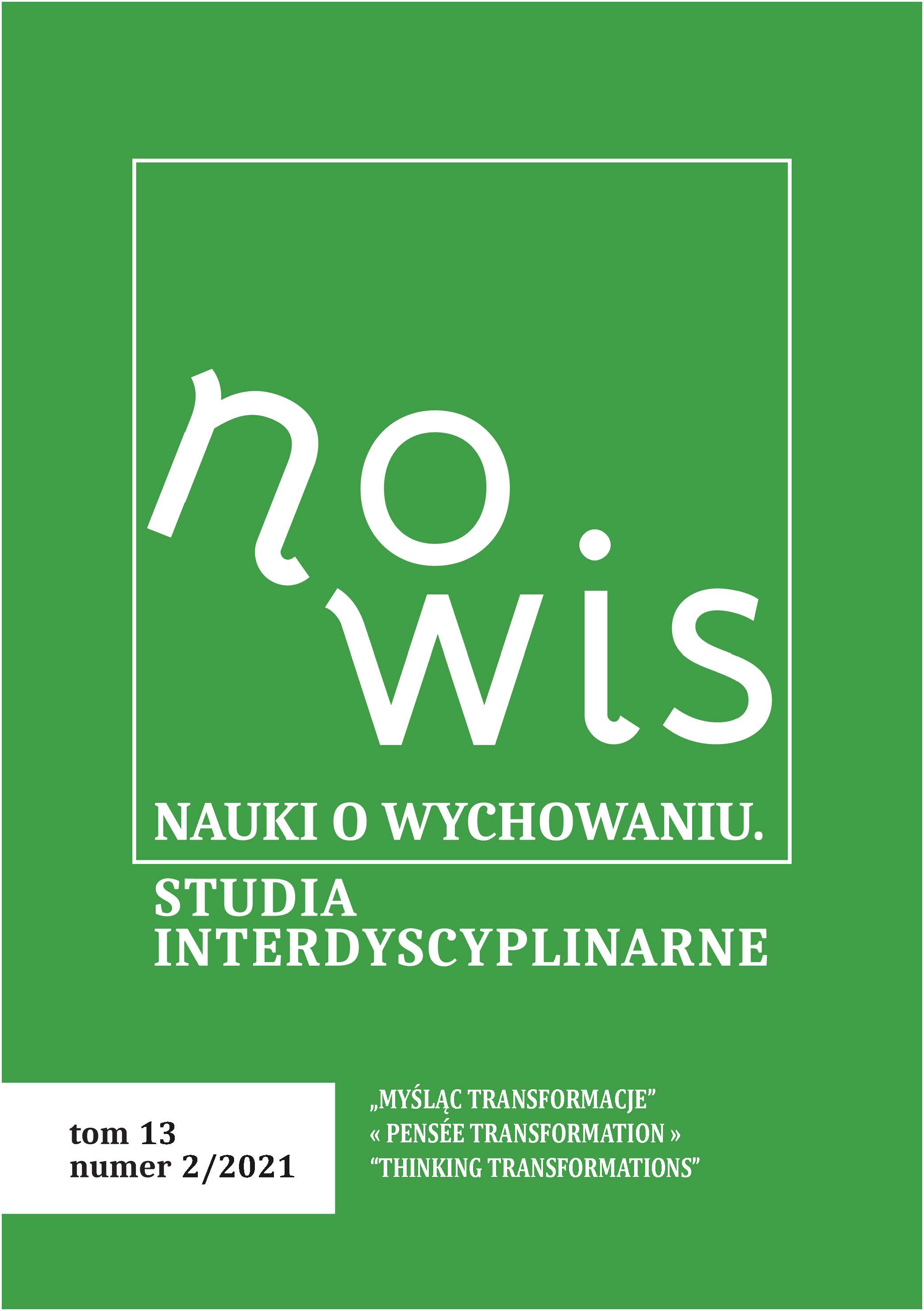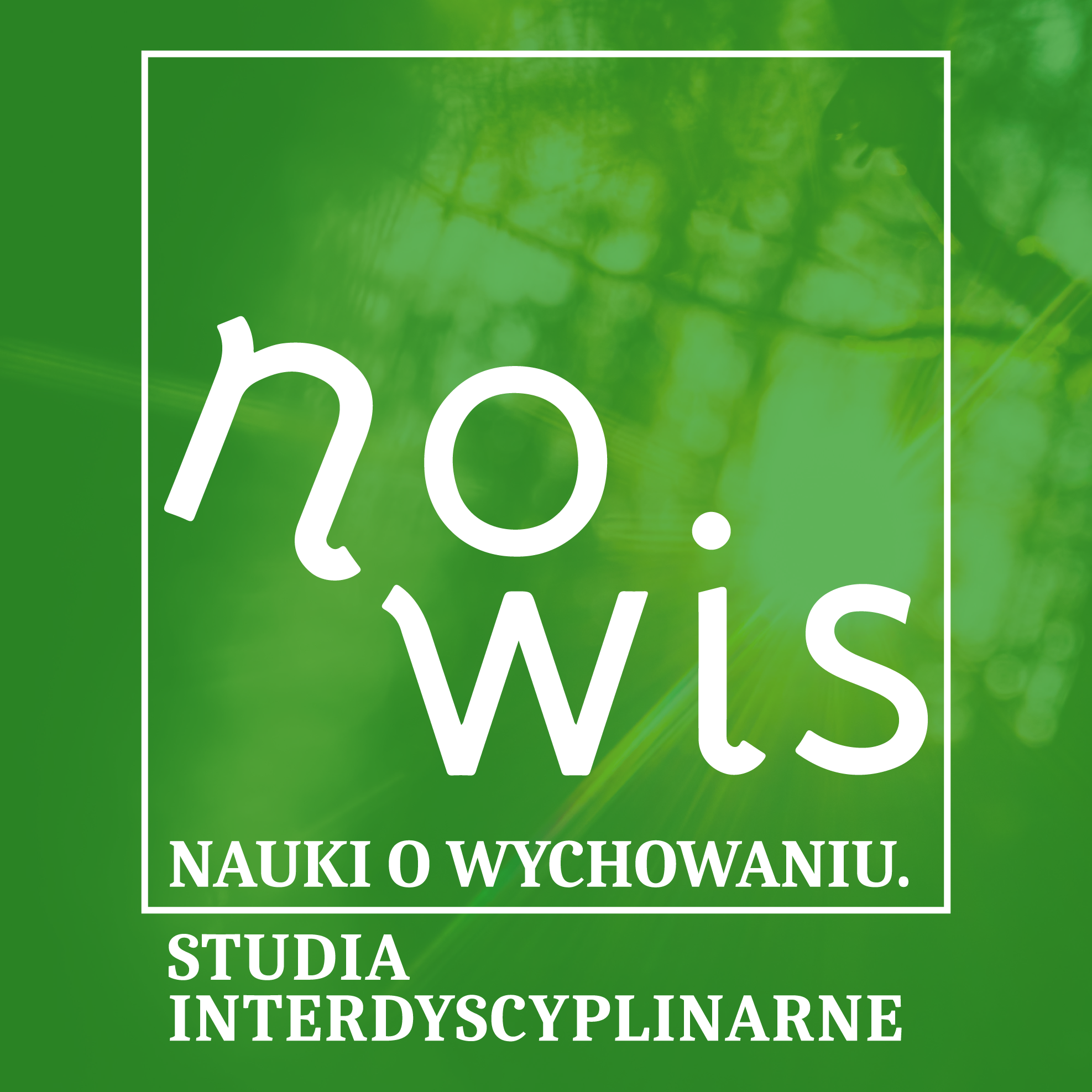Działanie profesjonalne i koncept „myśląc transformacje”
DOI:
https://doi.org/10.18778/2450-4491.13.04Słowa kluczowe:
action, transformation, penséeAbstrakt
Międzynarodowe tendencje w kierunku profesjonalizacji „poprzez” i „w” nauczaniu na poziomie wyższym przyspieszyły pojawienie się procesu kształcenia profesjonalnego, które nie zadowala się przygotowaniem przesłane do przewidywanego działania profesjonalnego, ale wprost przygotowuje do tego działania. W szczególności zaś do myślenia profesjonalnego, które odnosi się zarówno do procesów transformacji, jak też samo nią jest. Rozwijając w tym artykule koncept „transfromacje”, omawiamy liczne wymiary tego „myślenia”. Analizujemy m.in.: – myślenie o odziaływaniu na drugiego ujmowane jako oddziaływanie na jego aktywność; – myślenie o oddziaływaniu na aktywność drugiego ujmowane jest w kategoriach wzajemnego powiązania (couplage) między podmiotem działającym i aktywnością podmiotu, wobec którego skierowane jest oddziaływanie; – myślenie o tym, że oddziaływanie na drugiego jest również oddziaływaniem na uprzednią dynamikę aktywności podmiotu, wobec którego oddziałujemy; – myślenie o tym, że oddziaływanie na aktywność drugiego stanowi konstruowanie sytuacji działania; – oddziaływanie na aktywność drugiego jest także transformacją swego postępowania w trakcie działania; – oddziaływanie na aktywność drugiego jest też gotowością na wyodrębnienie transformacji intencjonalnych i transformacji dokonanych/zrealizowanych; – zaangażowanie w badania nad swym postępowaniem profesjonalnym jest także transformacją siebie.
Bibliografia
Astier P. (2003) La fonction situante de l’activité « Recherche et Formation », n° 42 : 87–98, https://www.persee.fr/doc/refor_0988-1824_2003_num_42_1_1828
Google Scholar
DOI: https://doi.org/10.3406/refor.2003.1829
Barbier J.-M. (1991) Elaboration de projet et planification, Paris, Presses Universitaires de France.
Google Scholar
Barbier J.-M. (2017) Vocabulaire d’analyse des activités. Penser les conceptualisations ordinaires, Paris, Presses Universitaires de France.
Google Scholar
Barbier J.-M., Durand M. (dir.) (2017) Encyclopédie ďanalyse des activités, Paris, Presses Universitaires de France.
Google Scholar
Bertaux. D. (2015) Le care comme partie émergée de la production de la vie, « Revue des Sciences Sociales», n° 52 : 118–128, https://journals.openedition.org/revss/3257
Google Scholar
DOI: https://doi.org/10.4000/revss.3257
Berthoz A. (2008) Physiologie de la perception et de l’action, « Annuaire du Collège de France », n° 108 : 303–327, https://journals.openedition.org/annuaire-cdf/314
Google Scholar
DOI: https://doi.org/10.4000/annuaire-cdf.314
Canguilhelm G. (1966) Le normal et le pathologique, Paris, Presses Universitaires de France.
Google Scholar
Clot Y. (2006) La fonction psychologique du travail, Paris, Presses Universitaires de France.
Google Scholar
DOI: https://doi.org/10.3917/puf.clot.2006.01
Dewey J. (1993) Logique. La théorie de l’enquête, Paris, Presses Universitaires de France.
Google Scholar
Dubosq J., Clot Y. (2010) L’autoconfrontation croisée comme instrument d’action au travers du dialogue : objets, adresses et gestes renouvelés, « Revue d’anthropologie des connaissances » , vol. 4, n° 2 : 255–286, https://www.cairn.info/revue-anthropologie-des-connaissances-2010-2-page-255.htm
Google Scholar
DOI: https://doi.org/10.3917/rac.010.0255
Dutoit M. coord. (2018) Apprendre d’une expérience rare, Paris, L’Harmattan.
Google Scholar
Eluard P., Chagal M. (1946) Le dur désir de durer, Paris, Éditions Arnold Bordas.
Google Scholar
Fleury C. (2018) Les irremplaçables, Paris, Gallimard.
Google Scholar
DOI: https://doi.org/10.14375/NP.9782072779275
Freud S. (1985 [1937]) L’analyse avec fin et l’analyse sans fin, traduction collective in : S. Freud, Résultats, idées, problèmes, tome II, Paris, Presses Universitaires de France.
Google Scholar
Gégout P. (2014) John Dewey La quête de certitude, « Recherches & éducations » [En ligne], 14, http://journals.openedition.org/rechercheseducations/2464, https://doi.org/10.4000/rechercheseducations
Google Scholar
DOI: https://doi.org/10.4000/rechercheseducations
Honneth A. (2007) La réification. Petit traité de théorie critique, trad. S. Haber, Paris, Gallimard.
Google Scholar
James W. (2005) Essais d’empirisme radical, trad. M. Girel, Paris, Agone.
Google Scholar
Jullien F. (2009) Les transformations silencieuses, Paris, Grasset.
Google Scholar
Lojkine J. (2018) L’anthroponomie de Paul Boccara , « La Pensée », n° 1/393 : 79–90, https://www.cairn.info/revue-la-pensee-2018-1-page-79.htm
Google Scholar
DOI: https://doi.org/10.3917/lp.393.0079
Malaterrre Ch. (2010) Les origines de la vie. Émergence ou explication réductive, Paris, Hermann.
Google Scholar
Meyerson I. (1995) Les fonctions psychologiques et les oeuvres, Paris, Albin-Michel.
Google Scholar
Nieztsche (2020) Rhétorique, Écrits philologiques, t. 10, trad. A. Merker, présentation A. Merker, Paris, Les Belles Lettres.
Google Scholar
Pagès M. (1977) Le travail amoureux. Eloge ďincertitude, Paris, Éditions Bordas.
Google Scholar
Simondon G. (2007), Ľindividuation psychique et collective : à la lumière des notions de forme, information, potentiel et métastabilité, Paris, Éditions Aubier.
Google Scholar
Tap P. (1987) Identité, style personnel et transformation des rôles sociaux, « Bulletin de Psychologie », t. XL, n° 379 : 399–403, http://www.pierretap.com/pdfs/71.pdf
Google Scholar
Theureau J. (2010) La constitution des savoirs dans ľaction, « Intellectica. Revue de l’Association pour la Recherche Cognitive”, n° 53–54/1–2. Philosophie, Technologie et Cognition : 95–127, www.persee.fr/doc/intel_0769-4113_2010_num_53_1_1180 ; https://doi.org/10.3406/intel.2010.1180
Google Scholar
DOI: https://doi.org/10.3406/intel.2010.1180
Vygotski L. (2019) Pensée et langage, trad. F. Sève, présentation J. Piaget, Y. Clot, L. Sève, Paris, Éditeur La Dispute.
Google Scholar
Weill-Fassina A. (2016) L’image opérative de Dimitri Ochanine en contexte, « Perspectives interdisciplinaires sur le travail et la santé » [En ligne], n° 1/18 : 1–30, http://journals.openedition.org/pistes/4655 , https://doi.org/10.4000/pistes.4655
Google Scholar
DOI: https://doi.org/10.4000/pistes.4655
Brossard M. (2004) Vygotsky Lectures et perspectives de recherches en éducation, https://books.openedition.org/septentrion/14163?lang=fr [consulté : 5.04.2021].
Google Scholar
DOI: https://doi.org/10.4000/books.septentrion.14157
Dutoit M., Barbier J.-M. (2018) Ni auto-formation, ni hétéro-formation : le concept ďapprentissage conjoint, « The Conversation », 1 November, https://theconversation.com/ni-auto-formation-ni-hetero-formation-le-concept-dapprentissage-conjoint-103651 [consulté : 5.04.2021].
Google Scholar
Jaspers K. (1958) Von der Wahrheit. Munich, R. Piper, https://www.degruyter.com/view/book/9783112312643/10.1515/9783112312643-008.xml [consulté : 5.04.2021].
Google Scholar
Pobrania
Opublikowane
Jak cytować
Numer
Dział
Licencja

Utwór dostępny jest na licencji Creative Commons Uznanie autorstwa – Użycie niekomercyjne – Bez utworów zależnych 4.0 Międzynarodowe.





 Strona czasopisma, prowadzona przez Zespół redakcyjny NOWiS na platformie Index Copernicus:
Strona czasopisma, prowadzona przez Zespół redakcyjny NOWiS na platformie Index Copernicus: 





